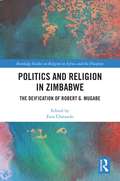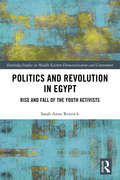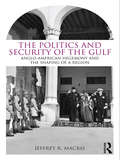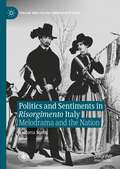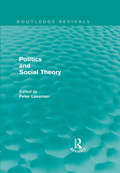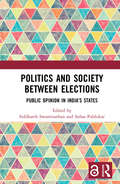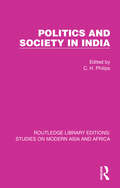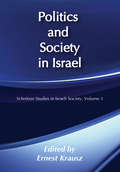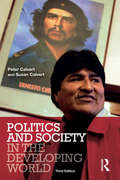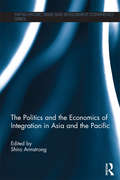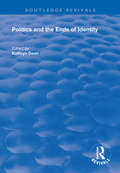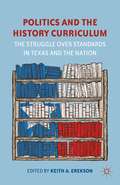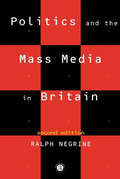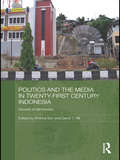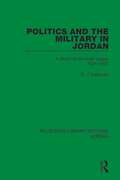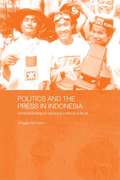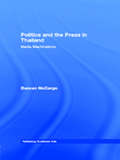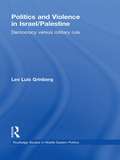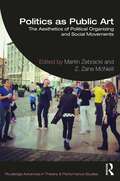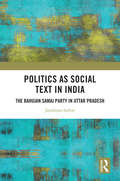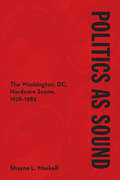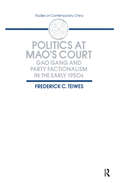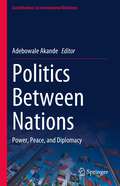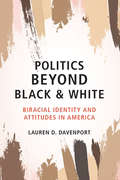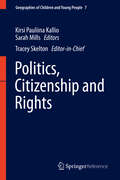- Table View
- List View
Politics and Religion in Zimbabwe: The Deification of Robert G. Mugabe (Routledge Studies on Religion in Africa and the Diaspora)
by Ezra ChitandoThis book illustrates how religion and ideology were used by Robert Mugabe to ward off opposition within his own party, in Zimbabwe and from the West. An interdisciplinary line up of contributors argue that Mugabe used a calculated narrative of deification – presenting himself as a divine figure who had the task of delivering land, freedom and confidence to black people across the world – to remain in power in Zimbabwe. The chapters highlight the appropriation and deployment of religious themes in Mugabe’s domestic and international politics, reflect on the contestation around the deification of Mugabe in Zimbabwean politics across different forms of religious expression, including African Traditional Religions and various strands of Christianity and initiate further reflections on the interface between religion and politics in Africa and globally. Politics and Religion in Zimbabwe will be of interest to scholar of religion and politics, Southern Africa and African politics.
Politics and Revolution in Egypt: Rise and Fall of the Youth Activists (Routledge Studies in Middle Eastern Democratization and Government)
by Sarah Anne RennickIn the years since the 2011 revolutions, Egypt and the Arab countries in general have moved from a profound moment of hope and democratic potential to deepened authoritarianism and outright war. Among the many political actors who have seen their political prospects rise and fall are youth activists, the revolutionary vanguard who spearheaded the transition process. This book offers a detailed analysis of Egypt’s revolutionary youth as a collective and non-institutionalized political actor since 2005, bringing forth in particular the organizational, ideational, and strategic dimensions of the social movement. It offers insights into the origins of the movement and its evolution over time, the activists’ claims and objectives, and the rationale behind their actions/interactions in the greater political arena. Proposing a theoretical framework that lies at the nexus of practice theory and social movement theory, the book demonstrates how the foundational practices of "youth" and "revolutionary" acted as the movement’s internal culture, shaping the activists’ claims and goals, their organizational structures, and their choice of strategies and repertoires of contention. In the context of a defunct Arab Spring and the region’s descent into deepened authoritarianism and ultra-violent conflict, the book sheds light on the Egyptian uprising and the reasons for its increasingly grim outcome by providing a detailed analysis of one of its key players and both the exogenous and endogenous reasons why the revolutionary youth activists failed to achieve their goals. As the first book to assess the revolutionary youth as a social movement distinct from other forms of activism and other youth groups/parties in Egypt, it will be a valuable resource for anyone with an interest in Middle East Studies, the Arab Spring, or social movements more generally.
The Politics and Security of the Gulf: Anglo-American Hegemony and the Shaping of a Region
by Jeffrey R. MacrisSince the 19th century the Gulf region has been an area of intense interest, having been influenced first by the British and more recently by the Americans. This book charts the changing security and political priorities of these two powers and how they have shaped the region. Adopting a narrative approach, the author provides background history on British involvement from the 19th century and a detailed analysis of the years after the Second World War, when oil supply became more critical. He covers the growth of US influence and the British withdrawal, and follows more recent changes as the US built up its military presence following Desert Storm and the invasion of Iraq. Looking at the three enduring missions fulfilled by the British - maintaining interstate order, protecting the free flow of commerce, which later included petroleum; and keeping out other Great Powers – the book demonstrates how these had by 1991 been assumed almost entirely by the American leaders. A comprehensive and thorough look at the history of the Gulf and the contemporary issues affecting the region, this will be essential reading for students of Middle East history, military history and diplomatic history.Visit the author's website at www.thepoliticsandsecurityofthegulf.com
Politics and Sentiments in Risorgimento Italy: Melodrama and the Nation (Italian and Italian American Studies)
by Carlotta SorbaThis book investigates the narrative of nationhood during the Italian Risorgimento and its ability to reach a new and wider audience. In Italy, an extraordinary emotional excitement pervaded the struggle for national independence, suffusing the speeches and actions of patriots. This book shows how this ardour borrowed the tones, figures and spectacular nature of the melodramatic imagination feeding the theatre and literature of the time, and how it could resonate with a largely uneducated audience. An important contribution to the new historiography on the Italian Risorgimento and on nineteenth-century nationalism in Europe, it offers a fresh perspective on the public sphere during the Risorgimento, focusing on the transnational links between political mobilisation and the growth of new media and burgeoning mass culture.
Politics and Social Theory (Routledge Revivals)
by Peter LassmanFirst published in 1989, this Routledge Revival is a major collection of essays on the competing traditions of social and political theory. The contributions, by international scholars, reflect the re-examination of the boundaries between the ‘political’ and the ‘social’, the ‘public’ and ‘private’, and ‘state’ and ‘society’. The reissue will be of great value to students in both sociology and political science. Bringing new arguments to bear on the debate about the place of political theory in social science, the contributors discuss such issues as the different languages used by sociologists to describe the state; Marxist and socialist theory; class analysis; the welfare state; feminist political theory; and the impact of post-modernity on contemporary social thought.
Politics and Society between Elections: Public Opinion in India’s States
by Siddharth Swaminathan and Suhas PalshikarElections are episodic; governance is routine. This book studies patterns in public opinion on politics and society between elections in India. By using the survey data covering 24 Indian states including the National Capital Region of Delhi (NCR), it will serve as State barometers of public opinion. The surveys seek to understand how politics and governance processes are nested in the social and political relationships between citizens inter se and with government functionaries. The book explores citizen perceptions about the social and political universes they inhabit in periods between elections. It examines social attitudes of citizens, friendship ties across social groups, gender roles and relationships; opinions on governance, ease of public service access, the citizen-state interface, and trust in political institutions; and, political attitudes and identity, nationalism, freedom of expression, and populism. This book explores public perceptions of everyday development and governance outcomes that are shaped by how the government functions between elections: how it relates to citizens on a regular basis; how it provides routine public services to them; and how public order is maintained. An incisive study on public opinion on politics, society, and governance in India, this book will be of great interest to scholars and researchers of political science, governance, public policy, and South Asian studies. It will also be of immense interest to bureaucrats, policymakers, think tanks, and organisations working in the areas of development studies, politics, society, and governance.
Politics and Society in India (Studies on Modern Asia and Africa)
by C. H. PhilipsIndia inherited a system of representative and responsible government from Britain, a large part of which was incorporated in the new constitution of independent India. But in the early 1960s it was already becoming clear that this political system could not long continue without change; and the probability is that the change would be considerable. A system deriving its inspiration from a homogenous, tight little nation-state like Britain could scarcely fit a sub-continent of heterogeneous elements like India. Already, under a deceptively smooth surface, important changes in the nature of Indian political life were taking place. Originally published in 1963, the purpose of these collected studies was to explore, in the rapidly changing situation, the intimate relationship of Indian politics and society and to indicate the ways in which the deeper social and political currents were moving. As an aid in assessing the degree of change in the modern political life of India, several studies of traditional attitudes towards politics in the Hindu and Muslim empires are included, along with an assessment of the central meaning of the fundamental British statement of policy in the Montagu Declaration of 1917. Against this background, the greater part of the volume discusses the practices and trends of the previous few years.
Politics and Society in Israel: Politics And Society In Israel
by Ernest KrauszThis series of the Israeli Sociological Society, whose object is to identify and clarify the major themes that occupy social research in Israel today, gathers together the best of Israeli social science investigation that was previously scattered in a large variety of international journals. Each book in the series is introduced by integrative essays. Each volume focuses on a particular topic; the first volume seeks out the dynamics of conflict and integration in a new society; the second volume is concerned with the sociology of a unique Israeli social institution—the kibbutz. The third volume presents sociological perspectives on political life and culture in Israel. Articles by leading scholars deal with: historical development; political culture and ideology; political institutions and behavior; the social basis of politics; and social change. Volume III also includes a select bibliography. Contributors to Volume III (tentative): Karl W. Deutsch, Yonathan Shapiro, Dan Horowitz, Moshe Lissak, Daniel Elazar, Asher Arian, Charles Liebman, Erik Cohen, Yoram Peri, Ephraim Yaar, S. Smooha.
Politics and Society in the Developing World
by Peter Calvert Susan CalvertIn a world seemingly surfing a wave of unprecedented affluence, it is sobering to be reminded that only thirty out of nearly two hundred countries can really be classified as advanced industrialized countries. Eighty per cent of the world's population lives in the developing world. This popular, concise introduction scrutinises the developing world, its varied political institutions and the key social, economic and environmental issues at the heart of contemporary debates. Wide-ranging and clearly written, Politics and Society in the Developing World begins by providing a brisk survey of the major theoretical and methodological interpretations of the social impact of development. It then details the factors which determine the parameters of the developing world before moving on to examine its infrastructure and the crises currently facing it. The book also covers the social and economic contexts of developing societies, the international arena and its impact on the developing world, state-building and the tension between dictatorship and democratization. The book focuses on four policy areas: aid, trade, tourism and the environment.
The Politics and the Economics of Integration in Asia and the Pacific (PAFTAD (Pacific Trade and Development Conference Series))
by Shiro ArmstrongThe shape of economic integration in the global and regional economies - and the extent to which goods, services and factors of production move more or less freely across borders - depends not only upon underlying economic conditions but also upon politics. Whether integration is market-led, as has been the case in Asia, or institution-led as in Europe, there are political elements that affect all forms of regional and international economic integration. While geopolitics influences international economic integration, so too does domestic politics. Economic integration in Asia has been driven by rapid unilateral trade and investment liberalization and, while trade and investment patterns have been determined largely by comparative advantage, political forces have also affected patterns of economic interdependence. The form that regional institutions take, and their effectiveness, also depends on political relations between countries. The particular circumstances in Asia, and the relationships between regional economies has profoundly shaped regional institutions and will continue to do so. The chapters in this volume draw on papers originally presented to the 33rd Pacific Trade and Development Conference held in Taipei in 2009 to look in original ways at how politics shape economic integration and its various dimensions in Asia and the Pacific and globally.
Politics and the Ends of Identity (Routledge Revivals)
by Kathryn DeanFirst published in 1997, this volume responds to the issue that identity can no longer be taken for granted, and features contributions from experts in politics, history and social theory on the concepts of identity politics and selfhood in cultures around the world. Stemming from the work of Erik Erikson, on the concept of identity, these articles expand to include Islam, Japan, India and America, along with a contemplation of international ideas of national sovereignty. They argue as a whole against notions of a growing global homogeneity of identity and against an ‘end to history’.
Politics and the History Curriculum
by Keith A. EreksonThe politicians and pastors who revised the Texas social studies standards made worldwide headlines. Politics and the History Curriculum sets the debate over the Texas standards within a broad context of politics, religion, media, and education, providing a clear analysis of these events and recommendations for teachers and policy makers.
Politics and the Mass Media in Britain
by Ralph NegrineThis fully-updated new edition of Politics and the Mass Media provides a comprehensive introduction to the role of mass communications in politics at all levels, from election campaigns, news reports and lobbying groups to the media activities of pressure groups.The relationship between politics, politicians and the media is a matter of increasingly contentious debate, as politicians' awareness of the importance of the media becomes more sophisticated amidst rapidly-advancing media technology and control.Providing a review of the nature and content of political communications and of recent theoretical developments, Negrine addresses the issues surrounding today's mass media, including cable and satellite television, investigation of the press, the relationship between the state and broadcasing institutions and the ever-present question of whether or not Britain needs a media policy. This new edition includes:* Case studies from television and the press* Fully revised text with updated sections on the press, broadcasting and media legislation* Brand new chapters on Europe and globalisation
Politics and the Media in Twenty-First Century Indonesia: Decade of Democracy (Media, Culture and Social Change in Asia)
by Krishna SenEvery political aspirant and activist knows the media are important. But there is little agreement on how an increasingly diversified media operate in post-authoritarian transitions and how they might promote, or impede, the pathways to a sustainable liberal democracy in the 21st century. This book examines the role of the media during Indonesia’s longest experiment with democratisation. It addresses two important and related questions: how is the media being transformed, both in terms of its structure and content, by the changing political economy of Indonesia after the fall of Suharto? And what is the potential impact of this media in enabling or hampering the development of democracy in Indonesia? The book explores the relation between the working of democratisation, by examining the role of ethnic identity and nationalism; increasingly cheaper and diversified means of media production, challenging state monopolies of the media; the reality of personalised and globalised media; and the challenging of the connection between a free media and democracy by global capitalism and corporate control of the media. The book argues that the dominant forces transforming Indonesia today did not arise from the singular point of Suharto’s resignation, but from a set of factors which are independent from, but linked to, Indonesia’s internal politics and which shape its cultural industries.
Politics and the Military in Jordan: A Study of the Arab Legion, 1921-1957 (Routledge Library Editions: Jordan #4)
by P.J. VatikiotisAmidst the turmoil in the Middle East, Jordan has presented a striking example of relative stability, and in this study, first published in 1967, Professor Vatikiotis sets out to show just how far Jordan’s stability depends on its army. The Jordan Arab Army, for long better known as the Arab Legion, was one of the best small fighting forces in the Middle East. Raised in 1921 by the late King Abdullah, the legion helped him to pacify the tribes and establish and extend his rule and authority over a fractious society in a region of vast desert expanses. The Legion then expanded into a disciplined military institution, but whereas the armies of several Arab states were involved in coups, the Jordan Arab Army has no such record. In this book, the author examines the particular historical conditions from which a state emerged in Jordan, and the role of the Arab Legion in its creation and consolidation.
Politics and the Press in Indonesia: Understanding an Evolving Political Culture
by Angela RomanoThis book explores the evolving political culture in Indonesia, by discussing the country's dominant political philosophies, then showing how those philosophies affect the working lives of ordinary Indonesian citizens. It focuses in particular on the working lives of news journalists, a group that occupies a strategic social and political position.
Politics and the Press in Thailand: Media Machinations (Rethinking Southeast Asia #Vol. 1)
by Duncan McCargoThis is the first book in the English language to examine the tangled web of relationships linking newspaper owners, editors and reporters, with leading politicians and power-holders. Duncan McCargo has been granted unique access to the editorial meetings of Thailand's leading newspapers, and drawing on this, the book uncovers the contradictions and dichotomies which underlie political coverage in the Thai press.
Politics and Violence in Israel/Palestine: Democracy versus Military Rule (Routledge Studies in Middle Eastern Politics)
by Lev Luis GrinbergThe Israeli regime is a paradox. Considered a democracy, it has no recognized borders and controls the majority of Palestinians by military rule, while the resistance of non-citizen Palestinians exerts major influence over politics and policies. Drawing on detailed academic research and a broad knowledge of Israeli politics and the Israeli-Palestinian conflict, this book narrates and analyzes the political developments of the Israeli-Palestinian peace process and the conflict with Hezbollah and Hamas, explaining the dangers to future negotiations and how hopes for a settlement have been dashed by the ongoing violence. The author explores the internal Israel and Palestinian politics, showing how they influence the conflict and explaining the central role of military organizations in shaping the relations towards the other nation. With particular relevance to current events, he analyzes the Unilateral Disengagement from Gaza and the second Lebanon War, which account for the deterioration into the present violence and political crisis, explaining the need for international mediation in order to reach a peace agreement and suggesting a new innovative model for future Israeli-Palestinian relations.
Politics as Public Art: The Aesthetics of Political Organizing and Social Movements (Routledge Advances in Theatre & Performance Studies)
by Z. Zane McNeill Martin ZebrackiPolitics as Public Art presents a keystone collection that pursues new frameworks for a critical understanding of the relationship between public art and protest movements through the utilization of socially engaged and choreopolitical approaches. This anthology draws from a unique combination of interdisciplinary scholarship and activism where it integrates geographically rich perspectives from political and grassroots community contexts spanning the United States, Europe, Australia, and Southeastern Africa. The volume questions, and reimagines, not only how public art practice can be integral to politics, including forms of surveillance and control of bodily movement. It also probes into how political participation itself can be construed as a form of public artmaking for radical social change and just worlds. This collection advocates for scholar-activist inquiry into how socially engaged public art practices can pave the way for thinking through—and working toward—championing more inclusive futures and, as such, choreographing greater intersectional justice. This book provides a wide appeal to audiences across humanities and social science scholarship, arts practice, and activism seeking conceptual and empirically informed tools for moving from public art and choreopolitical theory into modes of praxis: critical reflection and action.
Politics as Social Text in India: The Bahujan Samaj Party in Uttar Pradesh
by Jayabrata SarkarThis book explores the emergence of the Bahujan Samaj Party (BSP) as an alternative political force in Uttar Pradesh. It focuses on the historical continuity of Dalit social justice movements and organizational politics from pre- to post-colonial India and its subsequent institutionalization as a political force with the rise of the BSP in the state since the 1980s. The volume discusses the new age Dalit–Bahujan politics and its ethnicization of caste groups to create a bahujan samaj. The book analyzes the focused political leadership of Kanshiram and Mayawati, the strong party organization, and how they evolved an empowered Dalit ideology and identity by grassroots mobilization and championing Dalit icons and history. The author also explores the party’s strategies, slogans and alliances with other political parties and communities and its political manoeuvrings to retain its influence over the electorate. The book also effectively identifies the reasons for the political marginalization of the BSP in present times in the context of the phenomenal rise of the BJP in the state. The book will be of great interest to researchers and scholars of political science, sociology, Dalit and subaltern studies, exclusion studies and those working on the intersectionality of caste and class. It will also be useful for policy makers, think tanks and NGOs working in the domain of caste, marginality, social exclusion and identity politics.
Politics as Sound: The Washington, DC, Hardcore Scene, 1978-1983 (Music in American Life)
by Shayna MaskellUncompromising and innovative, hardcore punk in Washington, DC, birthed a new sound and nurtured a vibrant subculture aimed at a specific segment of the city's youth. Shayna L. Maskell explores DC's hardcore scene during its short but storied peak. Led by bands like Bad Brains and Minor Threat, hardcore in the nation's capital unleashed music as angry and loud as it was fast and minimalistic. Maskell examines the music's aesthetics and the unique impact of DC's sociopolitical realities on the sound and the scene that emerged. As she shows, aspects of the music's structure merged with how bands performed it to put across distinctive representations of race, class, and gender. But those representations could be as complicated and contradictory as they were explicit. A fascinating analysis of a punk rock hotbed, Politics as Sound tells the story of how a generation created music that produced--and resisted--politics and power.
Politics at Mao's Court: Gao Gang and Party Factionalism in the Early 1950s
by Frederick C TeiwesThe investigation of the rise and fall of Gao Gang suggests broader implications on the nature of elite politics in the Maoist era. The illumination of basic issues in Chinese politics in the context of this case, especially as regards the role of Mao Zedong, is relevant not only to the initial post-1949 period of comparative, but flawed, party unity, but also to the structural fault lines of the political system which were later to contribute so significantly to the Cultural Revolution.
Politics Between Nations: Power, Peace, and Diplomacy (Contributions to International Relations)
by Adebowale AkandeThis multidisciplinary volume examines the meaning of global conflict and cooperation by international actors that can be caused by dis- or misinformation to people and discusses how to build diplomacy for peace and regional cooperation. The book further identifies boundaries of the relationships among the various governments of the world, transatlantic alliances, international organizations, non-governmental organizations, transnational corporations, and the overall interdependence of nations in the making of the modern world. Topics discussed in this volume include diplomacy, international relations theory, Eurasia politics, European Union, Brexit, Taliban taking over of Kabul government, and the ongoing Afghanistan conflict, terrorism, ISIS and Al Qaeda, international law, international organizations, interstate and intrastate war, threats and challenges, global civil society, religion, and culture. The volume advances contemporary theories and concepts to explain these issues concerning peoples and cultures in the complex world we live in. The book is a must-read for students, researchers, and scholars of international relations, political science, political history, political geography, economics, and law in general, as well as diplomacy, political communication, and security studies in particular.
Politics Beyond Black and White: Biracial Identity and Attitudes in America
by Lauren D. DavenportThe U.S. is transforming into a multiracial society: today one-in-six new marriages are interracial and the multiple-race population is the fastest-growing youth group in the country. In Politics Beyond Black and White, Lauren Davenport examines the ascendance of multiracial identities and their implications for American society and the political landscape. Amassing unprecedented evidence, this book systematically investigates how race is constructed and how it influences political behavior. Professor Davenport shows that biracials’ identities are the product of family, interpersonal interactions, environment, and, most compellingly, gender stereotypes and social class. These identities, in turn, shape attitudes across a range of political issues, from affirmative action to same-sex marriage, and multiracial identifiers are shown to be culturally and politically progressive. However, the book also reveals lingering prejudices against race-mixing, and that intermarriage and identification are highly correlated with economic prosperity. The book's overall findings suggest that multiracialism is poised to dismantle some racial boundaries, while reinforcing others.
Politics, Citizenship and Rights
by Kirsi Pauliina Kallio Sarah Mills Tracey SkeltonThis volume explores the political geographies of children and young people and aims to cement this research area within human geography and beyond. Indeed, the policies that specifically target young individuals and groups, and the politics in the everyday lives of children and youth across all scalar dimensions deserve broad attention. The book is structured in four sections with specific focus on the spatialities of the rights of the child, children and young people's agency in politics, youthful practice as political resistance, and active youth citizenship. In the 28 chapters, a total of 43 authors based in 14 different countries explicate how issues of youthful citizenship, children's rights, and children and young people's political agencies cross disciplinary, methodological and theoretical boundaries, with notable geographical variation. Particular attention falls on children and young people's active roles in different kinds of political situations, environments, processes, and practices. The volume also emphasises that there is scope for future research, not least because of the shifting (geo)political landscapes across the globe.
